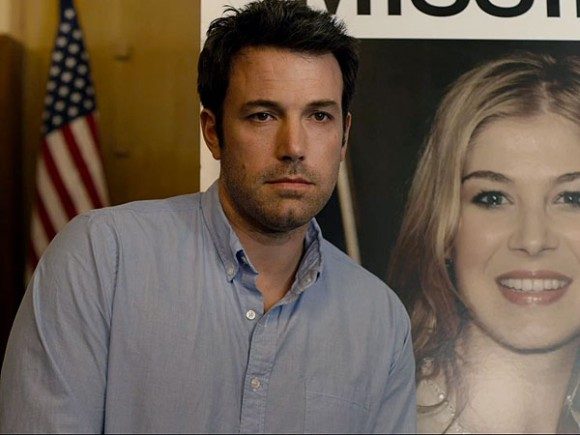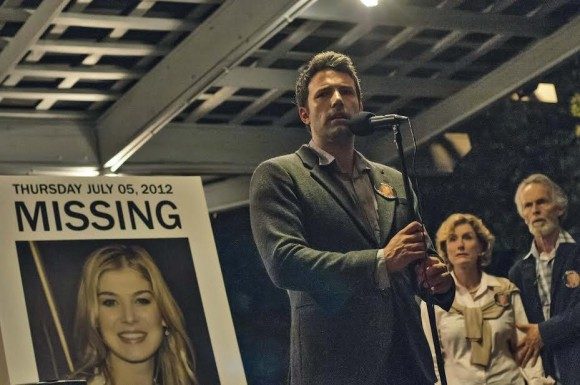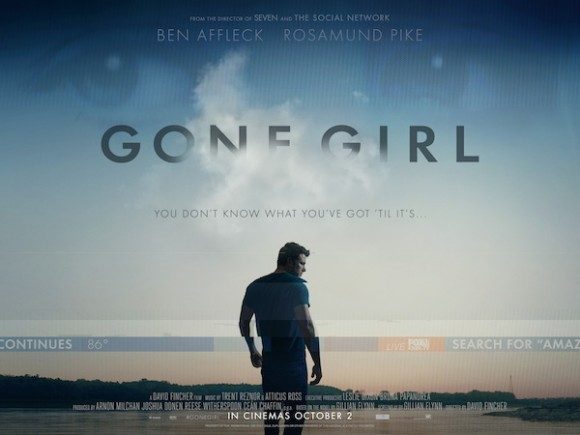The following contains spoilers for Gone Girl. You have been warned.
Gone Girl, David Fincher’s adaptation of the popular novel by Gillian Flynn, stormed into theaters this past weekend to wide acclaim. Greg Rodgers and Eduardo Ramos, Fincher fans both, joined me to dig a little deeper into the tale of Nick Dunne and his missing wife Amy.
Tim: Alright guys, let’s kick things off with some of your early thoughts coming out of the movie.
Eduardo: Well, my initial impressions were pretty good. I had a lot of ideas about what this film was going to be just based off of the trailers (having not read the novel) and in many ways they were met. I came away satisfied.
Greg: My feelings are a little more complicated because I had read the book, and Fincher is my favorite director working today. When I first heard he was going to be directing Gone Girl I was mildly disappointed, because as Tim pointed out in his review, the story is pure pulp. After The Social Network and Zodiac, I had really hoped Fincher would continue on the trajectory of doing elevated material. That said, I thought the exection was spot-on, and it was basically as good an adaptation of the novel as you could have.
Tim: So I have a question for both of you, since Greg brought the “pulp fiction” angle back into play: Another recent Fincher film was The Girl with the Dragon Tattoo, also based on what might be described as a pulp fiction novel. I have not seen that movie. Have either of you?
Eduardo: I have, yes. And that material is also somewhat “pulp”y. But I’ve always thought Fincher has a sort of knack for elevating that type of material, which is why I might have embraced the idea of him trying this again more than Greg did. I’m also generally very welcoming of these sort of esteemed directors sometimes going into “pulpy” thriller material as a digression in their careers. A great example was Stephen Soderbergh’s recent Side Effects, which I also enjoyed.
Tim: Sure, I think that’s often a lot of fun. As I was writing the review for Gone Girl, I just found myself wondering how the two compared. But the other thing I want to make sure we talk about since we have someone here who’s read the book is how much the ending actually varied. After all the hype about Gillian Flynn (who also did the screenplay here) changing the ending, a friend of mine told me they were mostly identical.
Greg: Ahh yes, the “radically different” ending. Pure hype. They are almost completely identical, save for Amy revealing her pregnancy to Nick on a talk-show interview in the movie. That was done while the two of them were alone in the book. So in that sense, I think Fincher was able to really drive home some of his points and satire of the media, which really worked.
Eduardo: Absolutely! The commentary on media and sensationalism was something I appreciated very much. It was so funny to me seeing that obvious Nancy Grace inspired “journalist” sensationalize Nick’s life, and Nick watching helplessly as it unfolds (like when she insinuates incest). Very, very interesting. And also this idea that there is a “right” way to react when your wife goes missing. I always have found that sort of silly when these junior psychologists go on television and diagnose people as sociopathic in regards to their actions after a tragedy or disappearance.
Tim: Ok, you know what the whole media discreditation thing reminded me of most? Harry Potter. It’s like freaking Rita Skeeter and the Daily Prophet all over again. I kept trying to push that out of my mind because tonally, it’s a completely different sort of thing. But I couldn’t help it. I almost laughed at some moments that perhaps would not have been appropriate to do so.
Greg: Tim, I’m glad you said the word “laughed.” Did you guys see this as a black comedy like I did? (Albeit a pitch-black one.) How did the audience in your theater seem to interpret it? Mine was deathly silent throughout the movie, so I’m not sure the humor is something that’s going to be appreciated by all audiences. But that type of humor is something I think is present in almost all of Fincher’s movies, and part of what makes him so great.
Tim: I think there’s definitely a sense of absurdism. I didn’t read it as a comedy, but I couldn’t take it completely seriously either, though that was mostly because the characters are so often just a nudge past truly believable. But the audience I was in laughed fairly regularly. I’d say mostly more in the sense of, “Hot damn, that just happened,” (usually in the context of Amy pulling one over on someone) instead of, “That was really funny,” but yes, they laughed.
Eduardo: There were some key moments where I did feel that Fincher was clearly playing some things up for at least some chuckles, though. And as for me, my audience reacted much in the same way as Greg’s. No laughter. One scene that comes to mind being the “press conference” where Anne’s parents go up there and have this entirely rehearsed speech complete with a domain name to find her daughter and donate to the cause. I found that completely ridiculous and cartoonish, albeit in a good way (I got what Fincher was trying to say), but nobody else seemed to react to it.
Greg: I don’t think we can talk about this movie any longer without mentioning Mr. Affleck. I for one normally can’t stand the guy and consider him one of the worst major actors working today. But I have to say, this role definitely played to his strengths and he was pretty fantastic. Though I would say Rosamund Pike – who also is not a great actress in my book – really stole the show, with what was an incredibly challenging role. Also – Tyler Perry!!! He was great, which was a shock, but a welcome shock. He seemed to play it just a shade lighter than his castmates, which was needed.
Tim: That was his character, though, and I agree it was needed. In a world where Amy can be this conniving and devious and plan everything so perfectly, you need a character who can see through the bullshit – even if we never really understand how he’s able to do it (or maybe he can’t and he just doesn’t care about representing guilty clients).
Eduardo: I agree with the idea that all three performances (Pike, Affleck, Perry) were pretty much solid ones, although I guess I just give far more credit to the casting than I do to the performances themselves. Not so much with Pike, but Affleck and Perry were both perfectly cast. Affleck was playing a version of himself, this sort of aloof guy publically who doesn’t always seem comfortable with being seen by the world. I think it was a very smart casting choice. Perry, well…he has this sort of, I don’t know how to say it without being cruel, slimy lawyer trait that comes off in interviews and the press as well. He was perfect.
Tim: Before we move too far away from it, I have to go back to the ending again. For me, it was the part of the film that broke the not-quite-a-farce nature of the movie and pushed it into unacceptably absurd territory (although it wasn’t so far away from being ok that it ruined the film for me). When Amy reveals that she’s pregnant, my first inclination was that she was lying. And before you even get to that, I didn’t believe Nick was willing to keep playing her game for public perception. There was enough evidence out there. I think he would’ve seen to it she got what was coming after putting him through the ringer like she did. Well, like they both did to each other, I guess, but I digress…
Greg: Yeah, the ending is definitely going to ruffle some feathers out there. That’s something where I think having read the book really influenced the way I saw it. Obviously I knew that’s where it was heading, which allowed me to see some of the earlier stuff in the movie as more absurd/farcical. So for me, that ending wasn’t a very far leap.
Tim: That’s so interesting because I got put through the paces with this film, not knowing where it was heading. It’s not that it was a Holmsian-level mystery, but it puts out the critical information like breadcrumbs, just leading you along until you can’t help but fall into the trap of some twist.
Eduardo: Regarding the believability of Nick staying with Amy, I agree. Although, I think that it was a case of the characters being sacrificed for a theme of the film. This idea of marriage and the image we put out to the public about our domestic lives. Happy, fulfilled, loving. I think what Fincher, or rather Flynn, wanted to convey more than anything was that Nick and Amy were this extreme (very extreme, of course) example of a married couple, projecting their perfect life to the world.
Greg: Right, great points, and that’s why it really plays as satire/comedy to me. It’s also something that, for me at least, prevents the movie from really being special. At the end of the day I’m watching two characters that are pretty deplorable, and I’m watching them being moved around a chess board. These aren’t “real” people who feel like they are making real, organic decisions. That’s somthing that was baked into the story by Flynn, and part of the reason I felt disappointed by Fincher directing the project.
Tim: Let’s go into the land of hypotheticals. Who would you have had to direct instead?
Greg: Oooh, great question. I was thinking to myself after the movie that if this were the early 90s, it would have been someone like Joel Schumacher or Adrienne Lyne. Don’t get me wrong, Fincher definitely brought something extra to this material, but there’s only so far you can take it. And because I hold him in such high esteem, I felt disappointed that he was doing something with a limited ceiling. Even at its best (which this is), it’s pulp. And rather forgettable in the grand scheme of things. So I’ve totally sidestepped your questions of current directors. I guess it’s a personal thing for me, and I would say someone who I don’t hold in such high esteem.
But let’s take a bit of a hard turn here and discuss another issue that I had with the movie, which was the opening act. Unlike any Fincher movie I can recall, this one really stumbles out of the gates. In particular, the flashback scene where we see how Nick and Amy meet feels really “off” and cutesy. The dialog is forced and the performances wooden. I remember those scenes playing so much better in the novel, and in reading it, I really liked the characters. Conversely, in the movie I found myself really disliking them right off the bat. Of course I think the movie corrects itself fairly quickly, but looking back I was really surprised at those early scenes and how poorly executed they were. In particular, I’m thinking about the “sugar kiss” scene.
Eduardo: Absolutely. A lot of those initial scenes detailing their courtship were too one-note and just rehearsed cuteness, and in the moment, viewing those scenes was very off-putting to me. I think the only redeemable thing, though, is that viewed within the larger context of the film I somewhat understand how forced and staged those courting scenes came off, because obviously Amy is not a reliable narrator and her journal is contrived. So I think that in the larger context of the film, I understand a little more why those scenes are presented the way they are. She’s trying to convey this clear narrative in her journal of them meeting in the most perfect and lovely way possible (even if they did indeed meet like that, I’m sure she spruces it up a bit), and then she can clearly make things go quickly dark and sinister to really indict Nick in her murder.
Tim: Wow, I saw a lot of the beginning very differently, I think. The somewhat stilted nature of the scene where they meet, or where Nick proposes actually worked for me given the thematic element that’s drawn out about people putting on acts for one another. And as for Amy’s journal, I think it’s probably remembering the best versions of those stories, but that also seemed fairly believable to me. It was only the hard turn towards, “Oh my gosh, Nick is violent!” that jumped out as fabricated. The parts I was more bored with were the present scenes of the early days of the manhunt for Amy. We know so little about Nick at that point, it doesn’t matter if we find out why he’s disinterested later, at the time he’s just a boring guy and we can’t figure out why he’s not more concerned that his wife is missing.
Greg: Glad you brought that up, Tim. It’s an issue that didn’t exist in the book, or at least wasn’t as prevalent, because of the internal nature of a novel and the way that it’s easier to identify with a character when you’re inside their “inner monologue” as you are in a novel. I agree that the film had some real narrative momentum issues in the first act because you had just met these two people, didn’t entirely like them, and you were asked to care about one of them being missing and possibly dead. It was all a little, “So what?” And just to go back real quick, to be clear it wasn’t the idea of those flashback scenes that bothered me, it was purely in the execution. In terms of the theme of putting on an act of your best self for the other person, I thought it was important for the characters to come across as genuine and likable, which neither did. Let me like them for a few scenes before you show me how awful they are.
Eduardo: I actually have a question for you Greg, and it is something I was thinking about earlier. Did the supporting characters come off as cartoonish in the book as they did in the film? I’m speaking namely of the overly concerned pregnant neighbor, the lady who had a minor but important part when she took that “selfie” with Nick, and even Amy’s parents, as well as the Nancy Grace character mentioned earlier. They were all these huge caricatures of this sort of folksy suburban people caught up in all the sensationalism that comes to their small town (and I’m not saying I didn’t admire that, I enjoyed the commentary). I was wondering if they are conveyed similarly in the book.
Greg: I’ll be honest, I read the book back when it was first published, so it’s been at least a couple of years. From what I remember, yes those supporting characters had a bit of a cartoonish, over-the-top vibe, but that was definitely all embellished by Fincher, as part of the satire. Now, whether Flynn originally intended for them to be so silly, or if it’s something Fincher realized and decided to play up, is something that I’m sure could be debated on and on without ever really knowing the answer. I’m probably inclined to believe the latter.
Tim: Let’s pull things around to some final thoughts. I recommend the film, I think it’s a lot of fun despite some of the issues we’ve talked about. If you haven’t read the book before, it absolutely has the potential to twist you up.
Greg: I would absolutely recommend the film and add that all of the issues I’m bringing up are issues viewed in the sense of Fincher’s overall career, so it’s a higher bar that we’re talking about. Relative to just about anything else that’s out there right now, I think it’s an excellent film and will – at the very least – provoke some strong and/or uncomfortable feelings for audiences, which I’m always in favor of.
Eduardo: I really enjoyed it, and I would surely recommend it. Along with everything that has been said, I just think it’s an easy film to recommend purely for the fact that it’s very accessible. It’s something I can recommend to somebody without knowing their tastes or inclinations. It’s just that universally appealing. I think it has definite flaws, but again, I enjoy when a prestige director like Fincher tackles pulp. I always prefer it over lesser directors trying their hand at pulpy material.
Greg: It’s also the best Tyler Perry movie you’re ever likely to see.
Tim: And I doubt we can offer higher commendation than that.





